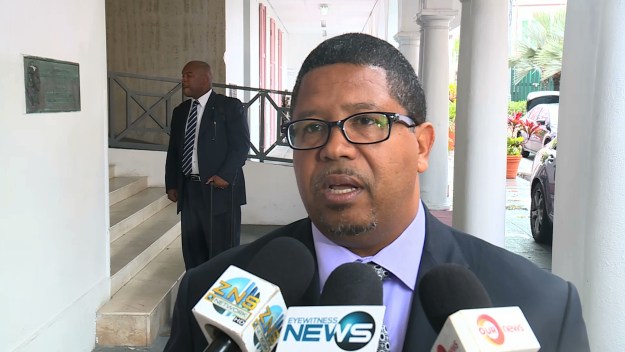NASSAU, BAHAMAS – Minister of Finance Peter Turnquest said yesterday that while international ratings agency Standard and Poor’s (S&P) took into consideration the fiscal policies implemented by the Minnis administration to improve the country’s finances, lower debt and strengthen its financial services sector regime, the likelihood of an upgrade of The Bahamas’ credit rating at this time is “not realistic”.
He was responding to questions from Eyewitness News Online on whether the government expected an improved sovereign credit rating, given the government’s policy initiatives and legislative efforts over the last year.
Turnquest said at this stage, having put in place the fiscal policy framework that is expected to turnaround The Bahamas’ finances over the long term “it is time for us to prove; in other words, for the results to start showing in a positive trend, so not only do we talk the talk, but walk the walk so to speak”.
“Until we are able to demonstrate with the numbers, I think it is probably — the likelihood of seeing a ratings upgrade is probably not realistic at this particular point,” he said.
“It is really key that we maintain the fiscal discipline that we speak about and translate that into actual numbers that demonstrate that we are moving in a positive direction”.
In its December report, S&P affirmed The Bahamas’ sovereign credit rating as BB+/B and ascribed a stable outlook due to an expectation of further fiscal consolidation and moderate economic growth over the next one to two years.
S&P said the rating reflected the country’s high external liquidity needs and rising debt levels, as well as the slow growth of the economy, which it said has lost competitiveness over the past decade.
However, S&P said The Bahamas’ “strong institutional foundation” continues to provide the necessary checks and balances that prevented “further erosion to creditworthiness”.
Additionally, S&P noted that it could raise the ratings over the same timeframe if the government reduces the annual increase in general government debt beyond its expectations.
The credit ratings agency acknowledged the government’s initiatives to improve economic growth prospects and slow debt growth, including its fiscal responsibility legislation which set targeted ratios for deficits and debt.
It also pointed to the international scrutiny of offshore banking in the country.
This month, Parliament passed a compendium of financial sector legislation which seeks to strengthen the financial services sector regime — a response to the increased compliance requirements from international financial sector regulatory bodies such as the Financial Action Task Force (FATF).
As a result, the FATF revised The Bahamas’ compliance rating this week and found it compliant or largely compliant with 30 of the 40 requirements.
As it relates to the potential fallout for the financial services sector as a result of the more stringent requirements, Turnquest said it is not expected to be as severe as some might suggest.
He said a lot of those industry stakeholders already comply with international standards and the requirements imposed by bodies such as the FATF.
“You may have some fallout from the less profitable side of the business, but it is not going to be significant in terms of the overall effect,” the minister said.
“So, taking all of that into consideration I think they (S&P) noted, but like all of us, we wait to see what the final shake-out is going to be.”


